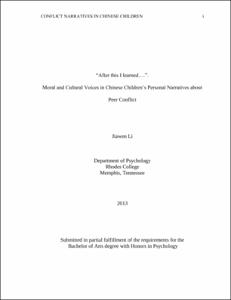Please use this identifier to cite or link to this item:
http://hdl.handle.net/10267/16550Full metadata record
| DC Field | Value | Language |
|---|---|---|
| dc.contributor.author | Li, Jiawen | - |
| dc.date.accessioned | 2013-06-19T20:51:47Z | - |
| dc.date.available | 2013-06-19T20:51:47Z | - |
| dc.date.issued | 2013-05 | - |
| dc.identifier.uri | http://hdl.handle.net/10267/16550 | - |
| dc.description | Permission to publish this paper was given by the author. It was submitted on a CD. | en_US |
| dc.description.abstract | Bruner (1990) proposed that sharing personal narratives is critical to social and moral development. Stories are told when something goes awry in human interaction. As we tell stories, we attempt to position ourselves vis-à-vis the other actors in our stories, those listening to our story, and the standards and norms of our larger cultural traditions (Bamberg, 2003). Although considerable work has examined parent-child narrative practices in China, no studies have looked at conflict narratives in Chinese elementary schoolers. We have studied 152 stories by Chinese 4th – 6th graders about ―a conflict that really happened to you.‖ Quantitative results showed unexpected grade effects, with firth graders exceeding the older and younger children in their reports of moral lessons, puzzlement and positive resolution of their conflicts. They were the most skilled appropriators of mainstream culture and values that approximate Confucian teachings. Qualitative analyses revealed children‘s use of other resources such as popular culture to form distinctive cultural voices. Both quantitative and qualitative analyses guide our discussion of children‘s use of narrative to position the self vis-à-vis cultural traditions undergoing rapid change in China. | en_US |
| dc.description.sponsorship | This paper was read and approved by Drs. Marsha Walton, Christopher Wetzel, Yeh Hseueh and Natalie Person. | en_US |
| dc.publisher | Memphis, Tenn. : Rhodes College | en_US |
| dc.rights | Rhodes College owns the rights to the archival digital objects in this collection. Objects are made available for educational use only and may not be used for any non-educational or commercial purpose. Approved educational uses include private research and scholarship, teaching, and student projects. For additional information please contact archives@rhodes.edu. Fees may apply. | - |
| dc.subject | Text | - |
| dc.subject | Psychology, Department of | en_US |
| dc.subject | Honors papers | en_US |
| dc.subject | Student research | en_US |
| dc.title | "After this I learned". Moral and Cultural Voices in Chinese Children's Personal Narratives about Peer Conflict | en_US |
| dc.type | Other | en_US |
| Appears in Collections: | Honors Papers | |
Files in This Item:
| File | Description | Size | Format | |
|---|---|---|---|---|
| Li Honor Final_2013.pdf | 471.2 kB | Adobe PDF |  View/Open |
Items in DSpace are protected by copyright, with all rights reserved, unless otherwise indicated.